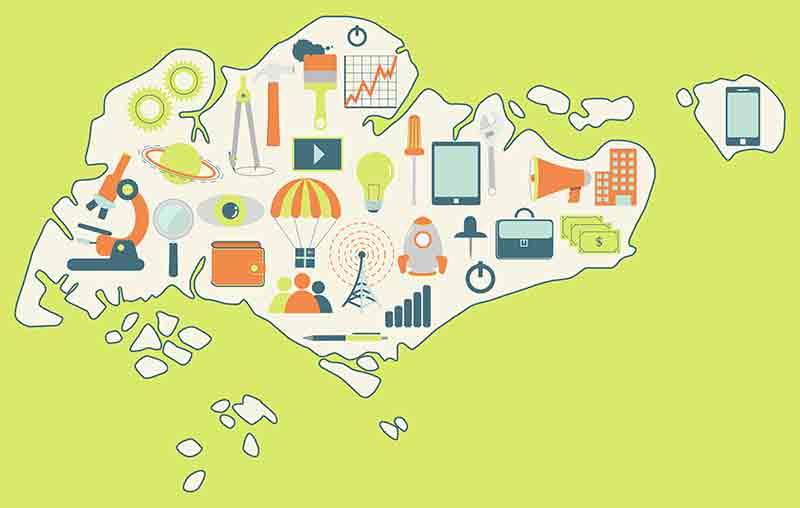
Today,
ASEAN is the 6th largest economy in the world, with a combined GDP
of US$2.55 trillion and a collective market of more than 600 million consumers.
Some experts see ASEAN potentially becoming the 4th largest single
market in the world by 2050, after the EU, US, and China.
At
the Asia Business First Forum 2018, Singapore Minister for Trade and Industry
(Industry) Mr S. Iswaran shared
how Singapore will advance ASEAN’s shared interests to grow e-commerce and
digital economy under its ASEAN Chairmanship this year.
Technology as a global trend
Minister
S. Iswaran named the emergence of digital economy a major trend that has been
rapidly changing the nature of economic activity. Such trend is enabled by the
advancement of technology which has now become a key driver of competitive
advantage for businesses.
The
ASEAN digital economy has the potential to grow to an estimated value of US$200
billion by 2025, with e-commerce accounting for US$88 billion.
“More
significantly, the digital economy can unlock the potential of SMEs across
ASEAN; it affords an unparalleled opportunity for the smallest enterprises to
access the most distant markets with relative ease,” Minister said.
“Therefore,
if ASEAN governments support and harness digital connectivity, and ASEAN
businesses keep pace with the shift towards digitalisation, the pay-offs will
be significant,” he emphasised.
Digital economy as a focus of Singapore’s
Chairmanship of ASEAN
ASEAN is a valuable platform that allows its member
countries to bring together the region’s collective efforts and resources to
secure coherent and substantive outcomes.
However, ASEAN will need to address the
challenges posed by the digital economy, such as cross-border data flows,
regional e-payments network, trade architecture update to support the digital
economy.
According to Minister S. Iswaran, in its Chairmanship of
ASEAN this year, Singapore is committed to deepen ASEAN’s digital connectivity to
position it for the growing opportunities in innovation and the digital economy
and to meet future challenges.
(1)
ASEAN
Agreement on e-Commerce
Singapore is working with ASEAN Member
States on specific initiatives such as an ASEAN Agreement on e-Commerce that
advances trade rules in e-commerce, lowers businesses’ operating barriers to
entry, and builds up greater digital connectivity, to facilitate e-Commerce
flows in the region.
This will provide a platform for aspiring
entrepreneurs, start-ups and Micro, Small and Medium Enterprises (MSMEs), to
market their products and services regionally, while making it easier for them
to send and receive electronic payments.
(2)
Framework
to monitor ASEAN digital integration
Singapore is working with its ASEAN
neighbours to develop a framework to monitor the progress of ASEAN’s digital integration.
“This will help ASEAN to assess and
benchmark our digital ecosystem and identify how we can empower all stakeholders
to benefit from ASEAN’s digital integration initiatives and efforts,” Minister
said.
(3)
ASEAN
Innovation Network
Singapore is also working on an ASEAN
Innovation Network. The Network seeks to strengthen the linkages between
innovation ecosystems in ASEAN member states to spark new collaborations and
solutions, which can address the demand from an increasingly sophisticated and
growing consumer base in the region.
(4)
ASEAN
Smart Cities Network
At the same time, the ASEAN Smart Cities
Network is also being developed to facilitate cooperation on smart cities
development, catalyse bankable projects with the private sector, and to secure
funding and support from ASEAN’s external partners.
(5)
Facilitative
trade architecture
Minister S. Iswaran pointed out that these
initiatives need to be complemented with a facilitative trade architecture in
order to deliver tangible benefits for businesses.
Singapore is therefore also pursuing an
array of initiatives, including the full implementation of the ASEAN-wide Self
Certification, a pathfinder for an ASEAN-wide Authorised Economic Operators
Mutual Agreement, ASEAN Single Window, ASEAN Trade in Services Agreement, and
an enhanced ASEAN Comprehensive Investment Agreement.
“These initiatives will facilitate the
seamless movement of goods within ASEAN, reduce administrative burdens and
costs for businesses especially SMEs, and improve the region’s regulatory
regime for trade in services and investment,” Minister said.
Outlook
for ASEAN
Given the region’s youthful population,
growing middle class and increasing urbanisation, Minister S. Iswaran is
optimistic about the outlook for ASEAN.
He commented that the realisation of
the ASEAN Economic Community (AEC) in 2015 has created a relatively seamless
business operating environment by reducing trade barriers, enhancing market
access, improving trade rules, and creating more overseas opportunities for our
businesses.
Minister attributed ASEAN’s achievements to
the commitment to keep markets open and perseverance in deepening economic
integration. However, he also cautioned the challenges that ASEAN face, under
the current global economic environment, such as the rise of anti-trade
sentiments, protectionist rhetoric, and doubts over the benefits of
globalisation.
“Against the backdrop of the current global
economic landscape, ASEAN must resist the tendency to look inwards, and draw on
its shared vision and collective strength to stay resolute in its commitment to
regional economic integration,” he cautioned.
To continue with its next phase of economic
integration under the AEC 2025 Blueprint, Minister said “ASEAN must remain
united, relevant, resilient and innovative by responding to changing global
economic trends and harnessing emerging opportunities, even as it deepens
regional integration”.
“It is only through a sustained effort to build
a competitive, resilient and innovative region that ASEAN can anchor its
relevance on the global stage. Positioning ourselves well to tap into the new
opportunities of the digital economy and other emerging technologies will
further reinforce ASEAN’s value proposition and ensure a united and prosperous
future for our businesses and our people,” he concluded.
















